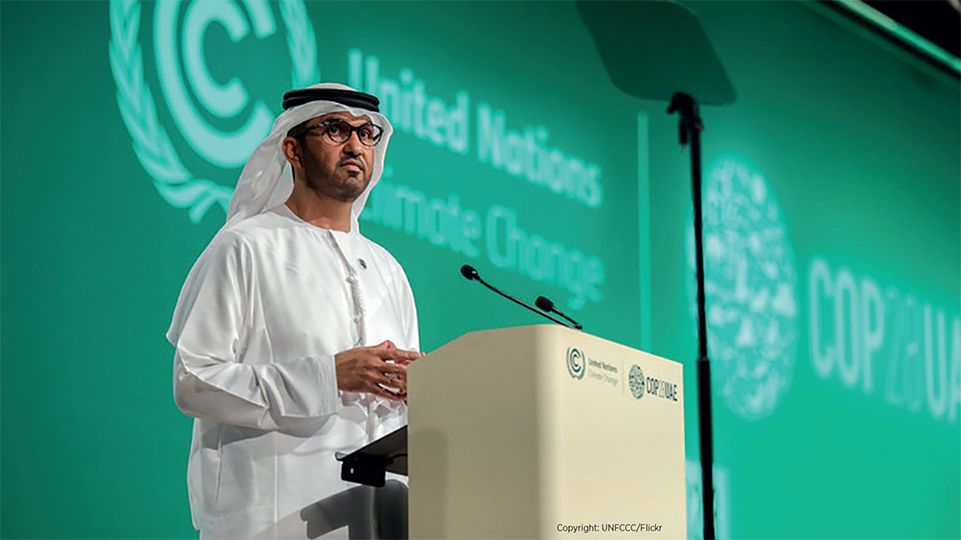A number of countries have made pledges to the “critically important” loss and damage fund at COP28 to ensure it is operationalised within a year of it being announced at last year’s Conference of Parties.
Host country United Arab Emirates (UAE) was the first nation to commit $100m to the fund, as COP28 president Dr Sultan Al Jaber (pictured) called on other counties to follow suit. This was followed by $100m from Germany, £40m from the UK (plus a further £20m for other arrangements), $10m from Japan and $17.5m from the US.
The loss and damage fund was a last-minute agreement at COP27 in Egypt last year, with the intention of assisting developing countries most vulnerable to climate change, although it wasn’t clear how much each contributing state would put forward.
A few weeks ago on Sunday 5 November, the fifth meeting of the transitional committee in Abu Dhabi countries came to an agreement on a set of recommendations for how a loss and damage fund would function.
The committee agreed the World Bank will administer the funds in the first instance, a decision that has called into question an emphasis on developed nations and has invited parties to submit nominations of representatives for membership of the board that will oversee and govern the fund as soon as possible. The first board meeting is to be held no later than 31 January 2024.
See also: – COP28: Time for a course correction
Announcing the UAE’s pledge today (30 November), Al Jaber said: “What was promised in Sharm El Sheikh has already be delivered in Dubai. The speed at which the world came together, to get this fund operationalised within one year since Parties agreed to it in Sharm El Sheikh is unprecedented.
“This fund will support billions of people, lives and livelihoods that are particularly vulnerable to the effects of climate change. It proves the world can unite, can act, and can deliver. Over the next two weeks this presidency will work with parties to now deliver the highest-ambition response to the global stocktake.”
The meeting also generated a number of recommendations on implementing the fund, including the provision of essential grant-based support to countries especially impacted by climate and loss.
Germany’s development minister, Svenja Schulze, said: “Germany and the UAE are jointly leading the way. At the same time, we are jointly calling on all countries that are willing and able to make contributions of their own to the new fund responding to loss and damage. In this way, we are building bridges between traditional donor countries and new, non-traditional donors. After all, many countries that were still developing countries 30 years ago can now afford to shoulder their share of responsibility for global climate-related loss and damage.”
Reaction
However, some said although the operationalisation of the fund was “historic”, there is still a number of concerns that need to be addressed.
Harjeet Singh, head of global political strategy at Climate Action Network International, said: “Amid the historic decision to operationalise the loss and damage fund within a year of its establishment, addressing underlying concerns becomes critical. On one hand, rich countries have pushed for the World Bank to host this fund under the guise of ensuring a speedy response. Conversely, they have attempted to dilute their financial obligations and resisted defining a clear finance mobilisation scale.
“The responsibility now lies with affluent nations to meet their financial obligations in a manner proportionate to their role in the climate crisis, which has been primarily driven by decades of unrestrained fossil fuel consumption and a lack of adequate climate finance delivered to the global south.”
Ghiwa Nakat, the executive director of Greenpeace Mena (Middle East and North Africa), was more optimistic: “This is the kind of leadership we expect from the host country and we urge other countries to follow suit. Rich developed countries must step up with major contributions to the new fund, and polluting industries must also be made to pay. If the COP presidency can build on this with a consensus agreement on a just phasing out of fossil fuels, COP28 will indeed be an historic event.”
Shami Nissan, partner and head of sustainability at Actis, added the agreement on the loss and damage fund on day one of COP was a “strong start”.
“Hopefully this momentum can be maintained throughout the conference.
“This fund has long been a sticking point in international climate negotiations so the deal that has been reached represents an important breakthrough. While all countries are exposed to climate risks, the science shows that on the whole developing countries are more likely to be affected and experience disproportionate loss and damage. In other words, those with the fewest means will have the highest price to pay. This is why an agreement was so important if we are to have a just transition.
“This COP28 agreement is not the end of the story however. Without wishing to rain on the parade, it’s important to caution that we now need to see the agreement implemented and followed through in practice, with donor countries acting on their commitments.”





